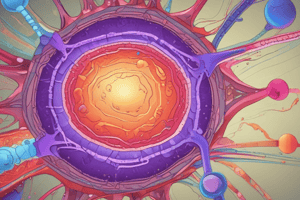Podcast
Questions and Answers
Explain the concept of reversible and irreversible cell damage.
Explain the concept of reversible and irreversible cell damage.
Reversible cell damage can be restored to homeostasis, while irreversible cell damage results in cell death.
What are some causes of cell damage?
What are some causes of cell damage?
Causes of cell damage include physical, chemical, infectious, biological, nutritional, and immunological factors.
What are some physical agents that can cause cell damage?
What are some physical agents that can cause cell damage?
Physical agents such as heat or radiation can damage a cell by cooking or coagulating their contents.
How does cell death occur?
How does cell death occur?
Describe the targets of cell damage.
Describe the targets of cell damage.
Which of the following is a physical agent that can cause cell damage?
Which of the following is a physical agent that can cause cell damage?
What is the main consequence when the severity of cell injury exceeds the cell's ability to repair itself?
What is the main consequence when the severity of cell injury exceeds the cell's ability to repair itself?
Which components of the cell are most notably targeted by cell damage?
Which components of the cell are most notably targeted by cell damage?
Which condition can impair the production of adenosine triphosphate (ATP) and deprive the cell of essential materials needed to survive?
Which condition can impair the production of adenosine triphosphate (ATP) and deprive the cell of essential materials needed to survive?
What type of cell death may occur due to exposure to a harmful stimulus for an extended period?
What type of cell death may occur due to exposure to a harmful stimulus for an extended period?
What is the role of a pathologist in modern medical treatment?
What is the role of a pathologist in modern medical treatment?
How does the term 'pathology' idiomatically refer to the progression of diseases?
How does the term 'pathology' idiomatically refer to the progression of diseases?
What components of disease does pathology address?
What components of disease does pathology address?
In what ways does the term 'pathology' refer to the study of disease in general?
In what ways does the term 'pathology' refer to the study of disease in general?
What is the broader context in which the term 'pathology' is used in modern medical treatment?
What is the broader context in which the term 'pathology' is used in modern medical treatment?
Flashcards are hidden until you start studying
Study Notes
Cell Damage and Cell Death
- Cell damage can be reversible or irreversible, depending on the severity of the injury
- Reversible cell damage occurs when the cell's ability to repair itself is not exceeded, whereas irreversible cell damage leads to cell death
- Causes of cell damage include:
- Chemical agents (e.g., toxins, drugs)
- Physical agents (e.g., radiation, temperature extremes, mechanical trauma)
- Infections
- Nutritional deficiencies
- Metabolic disorders
- Physical agents that can cause cell damage include:
- Ionizing radiation
- Ultraviolet light
- Extremes of temperature
- Mechanical trauma
- Cell death can occur through:
- Apoptosis (programmed cell death)
- Necrosis (unprogrammed cell death)
- Targets of cell damage include:
- Cellular membranes
- DNA
- Mitochondria
- Endoplasmic reticulum
- Cytoskeleton
- The main consequence of cell injury exceeding the cell's ability to repair itself is cell death
Cell Death and Energy Production
- ischemia (reduced blood flow) can impair the production of adenosine triphosphate (ATP) and deprive the cell of essential materials needed to survive
- Prolonged exposure to a harmful stimulus can lead to chronic cell injury and eventually, cell death
Pathology and Disease
- A pathologist plays a crucial role in modern medical treatment by examining tissues and cells to diagnose and understand diseases
- The term 'pathology' idiomatically refers to the progression of diseases, addressing the abnormal changes that occur in the body
- Pathology addresses the causes, mechanisms, and consequences of disease
- In modern medical treatment, the term 'pathology' refers to the study of disease in general, encompassing the broad context of abnormalities that can affect the body
Studying That Suits You
Use AI to generate personalized quizzes and flashcards to suit your learning preferences.




